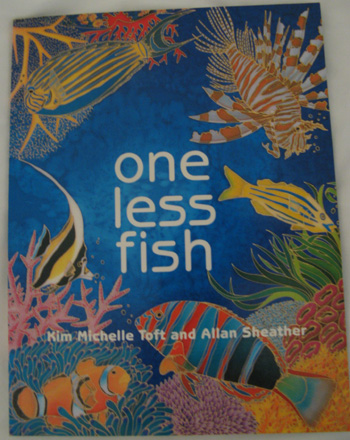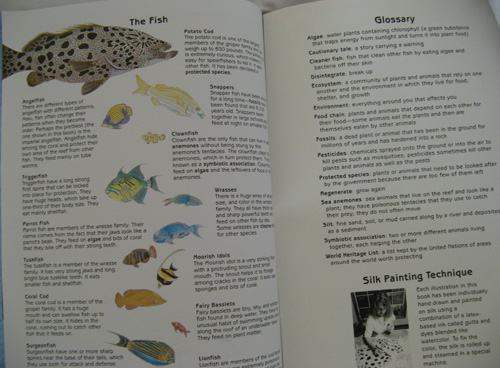
One less fish
by Kim Michelle Toft and Allan Sheather
Watertown, MA: Charlesbridge Publishing
1998
Within the past week, each of the two Free-Ride offspring picked up this book, read it all the way through, and said to me, “You should write about this for the Friday Sprog Blog.”
Instead of replying, “No, you should write about it,” I said, “OK, I’ll try.” Not just because I’m the mature one here, but because this is a really good book.
On the surface, this is one of those picture books with rhyming text counting down from twelve to zero:
Twelve gracious angelfish
thinking they’re in heaven.
Along came the divers —
now there are
“ELEVEN!” shout the children reading the book before the page is turned. (There is a certain satisfaction to knowing what’s coming.)
But before the focus shifts to the next number, there’s more information:
Spearfishing and scuba diving are popular sports, although today many divers only look at or photograph fish and do not kill them.
You’re not just tracking the disappearance of the fish, one by one, but getting more details on the causes of their disappearance — and on how, perhaps, we can keep more from meeting the same end.
The additional information about the dangers posed by oil leaks, plastic bags, sunlight-blocking silt, dragging anchors, and overfishing, among other hazards, is presented in smaller type, which means a grown-up can probably weasel out of reading it to a younger kid who’s in a hurry to get to the next page (or to bed). Also, it is not in verse, which means the authors didn’t have to find rhymes for “ecosystems” or “pesticides”. Still, this information is presented clearly enough that a second grader can read it him- or herself and understand it.
Indeed, as a gesture in the direction of a happy ending, the “countdown” portion of the book is followed by a couple pages describing the efforts to protect fish and their habitat in the Great Barrier Reef in Australia. (The book is very reef-centric, which makes sense given that it was produced with the support of the Great Barrier Reef Marine Park Authority.)

The colorful illustrations are hauntingly beautiful, and the penultimate page of the book gives detailed (yet kid-intelligible) descriptions of each type of fish mentioned in the book. The last page has a glossary; we Free-Rides like a good glossary.
This book is fun to read and provokes good discussions about how people can lessen their impact on cool aquatic critters. It may also lead a kid to want to take up scuba diving. Proceed at your own risk.

Ah yes! Your post brings back memories! My two oldest kids “first book read” was “Under The Coral Sea”, from the Shedd Aquarium.
So, what do the kids think about PETA re-branding fish as “Sea Kittens”?
Ack. Sounds like a lovely book, but I’m having difficulty getting past “one less”. Surely there’s a cute title available without such a blatant grammatical error.
I can recommend “The World That We Want”, also by Toft. Gorgeous art and a great ‘read-aloud’ book. I bought it for my niece and nephew, and liked it so much I bought another copy for myself. Have the free-ride offspring see it?
http://www.amazon.com/World-That-We-Want/dp/1580891152/ref=sr_1_2?ie=UTF8&s=books&qid=1232122294&sr=1-2
That was my first response as well. I don’t even like standing in the express checkout at the grocery store when the sign reads, “10 Items or Less”. I once returned a book I had bought as a gift for my nephew because when I read it all the way through at home the phrase “My Daddy and me…” kept reappearing. As in, “My Daddy and me like to go spearfishing.”
I feel your pain on the grammar. (I’ve been known to shout at Apple billboards, “Think differentLY!”) And the sprogs have been made aware that it should be one fewer fish. However, they are of the opinion that saving aquatic life from human encroachment is a more time-sensitive task than saving English grammar from careless children’s authors.
I hope they’re right!
It is now.
TDs, what you’re seeing above is known as recalcitrance. It’s a reaction to change wherein the subject gets all hot and bothered about that change. It’s marked by outrage, indignity, and the cry (usually expressed in a high, nasal whine), “That’s not right!”
It’s usually the ungodly old, like your mom, who suffer from recalcitrance. Patience and understanding are called for here; not everybody handles change well. Whenever possible reassure Mom with these words of wisdom, “When we grow up and have TDs of our own you’ll be gramma-tical.”
I adore the sprogs, Freeride!
Dr Freeride, you can relax about that one. ‘Less’ is and has always been a perfectly grammatical choice with countable nouns. Toft at al are blameless in this matter.